![]()
The Charlotte News
Wednesday, January 19, 1944
FOUR EDITORIALS
![]()
![]()
Site Ed. Note: The front page reports that the Baltic Army had captured the heavily fortified Krasnoye Selo, fifteen miles southwest of Leningrad, plus the key road junction at Roksha. The offensive, advancing from Pulkovo south of both Leningrad and Oranienbaum, was reported by Stalin to have inflicted a serious defeat on fifteen German armored divisions which had been shelling Leningrad during its siege, beginning in September, 1941, (not September, 1942 as the report erroneously implies by stating its length as "seventeen months"). The blockade of Leningrad had been broken a year earlier with the penetration of the Russian forces through Schlesselburg to the east of the city. But the Nazis had fortified the western and southern flanks of the city and had been regularly bombarding it from these positions since that time.
To the simple minds of Adolf Hitler and his facile Prussian generals, it was likely no coincidence that the German strategy against Leningrad had resembled, nearly precisely, save that the siege lines were to the south and east, that of the Union Army against Petersburg, Virginia, during the last year of the American Civil War.
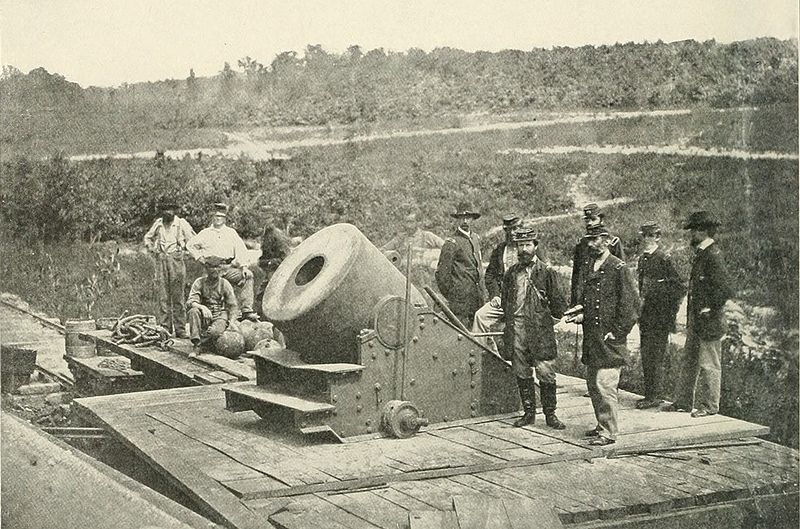
Gains were registered of between 7.5 and 12.5 miles along the area of breakthrough of the German lines to the southwest of Leningrad, widening the gap to 20 to 25 miles.
Between Lake Ilmen and the Baltic, another force attacked the German lines north of Novgorod, a hundred miles southeast of Leningrad, the two offensives being designed in coordination to break the Nazi positions entrenched to the west and south of the besieged city.
In Italy, British troops of the Fifth Army had crossed the lower Garigliano River at three points while under heavy enemy fire, to approach the Appian Way, main road to Rome. The thrust had begun at 9:00 p.m. on Monday, eighty miles southeast of Rome. The first crossing was at Suio, seven miles inland from the Tyrrhenian Sea, where heavy fighting continued; the second, four miles from the coast on the railroad from Rome to Capua; the third, at Argento, close to the coast, where the Germans countered the British with a strong, but repulsed tank attack.
Groundwork for the crossings had been laid by the British on December 30 when they had crossed the Garigliano, destroying an important highway and railway bridge and capturing several German prisoners brought back to headquarters for interrogation.
All of this action was prelude to the Allied amphibious landing to occur three days hence at Anzio and Nettuno, in an attempt to flank the Gustav Line of the Germans in the area of Cassino, leading to prolonged fighting, the bloodiest in Italy, through the day prior to D-Day.
A report from London singles out Major James H. Howard of St. Louis, a former Flying Tiger under General Claire Chennault in China and Burma, as the newest air hero of the war, ranking beside Butch O'Hare, killed in action during December. Major Howard had out-dueled 30 Luftwaffe fighters over Oschersleben in Germany as they gave chase to the bombers of the large American raid the previous Tuesday on Magdeburg and Halberstadt, consisting of 700 bombers and 500 fighters. The Major, burning out three of his four 50-calibre machineguns, bagged two Nazi fighters, probably shot down two more and damaged a fifth. Some of his fellow Mustang pilots, however, swore that they had seen him shoot down six, the same bag which had made Butch O’Hare famous at the outset of the Pacific War.
The Major's P-51 Mustang suffered only one bullet hole and the 401st Bomb Group which he was protecting suffered not a single missing. The entire raiding force, however, had suffered a record loss of 59 bombers and five fighters, making the Major's feat the more daring and impressive. The Nazis had deployed their new rocket-plane to chase down some of the bomber groups, though it was not indicated that these planes were involved in pursuit of the 401st.
Nonchalantly, when it was finally determined through eyewitness accounts what the reticent 30-year old Major had accomplished, he simply said, "I just seen what looked like my duty and I done it."
The Major had graduated from Pomona College in California in 1937 and was planning to follow in his father's footsteps into medicine when he joined the Naval Air Corps, subsequently switching to the Army Air Corps. Glad of that, for becoming an English teacher perhaps would not have been the best choice of professions.
The report, continued on the editorial page, indicates that the Major had scored in all 13 and a third probable enemy losses in the two theaters of action in which he had participated. He stated that he had feared being downed over enemy territory in the Pacific more than in Europe, harboring a special hatred for the Japanese which he did not feel for the Germans.
On hand in London, incidentally, for the press conference celebrating the Major's heroics, were CBS radio war correspondent Walter Cronkite and a young Andy Rooney, then a reporter for Stars and Stripes.
Major Howard went on to become a Brigadier General in the Air Force in 1948, commanding the 96th Bomb Wing out of Pinellas, Florida, and lived until 1995. He was awarded in June, 1944 the Congressional Medal of Honor for his daring during the January 11 raid, the only fighter pilot over Europe ever to receive the highest award for bravery during the war. The medal was presented to him by European Air Chief of Staff, General Carl Spaatz, as depicted below.
The reference to "Lone Eagle" in the header of the piece was for his having hailed from St. Louis, home to Charles Lindbergh when he began his life flying the mail and from which, at Lambert Field, he began his training for the historic first trans-Atlantic flight of 1927. General Howard later became civilian manager of Lambert Field. In 1991, he published an autobiography of his wartime experience, Roar of the Tiger.
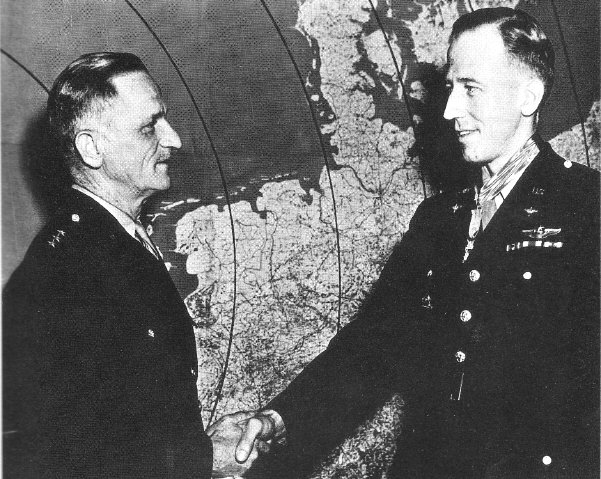
Charles Wilson, chair of the Aircraft Production Board announced that there would be a 50 percent increase in combat aircraft production during 1944 over the already record-breaking output of 1943. Airframe weight would be increased by an average of 25% over that of the previous year, meaning more large bombers would be produced.
The re-printing of a story from the London Sunday Times by Pravda that, while Franz von Papen had not made peace overtures to the Turkish Government in Ankara, other German officials had, caused Muscovites consternation. In conjunction with the first Pravda story earlier, stating that the British had entertained unilateral discussions with Germany regarding a separate peace, the publication had caused general reaction questioning whether in fact the British were stabbing the Russians in the back, as the correspondent for the Times had stated that the alleged terms offered by Germany included continued unrestrained action by the Germans in the East, meaning Russia. The report, coming out of a London newspaper, suggested to the Russians that there was some credibility to be attached to the story.
Meanwhile, Moscow radio broadcast the official British denial of the rumor and Germany denied that Foreign Minister Joachim von Ribbentrop had made any such overtures of peace to the Allies. The Germans contended that Pravda had published the story to gain renewed promises of support for the Soviets from the British and Americans regardless of the outcome of the Polish border question. The radio broadcast of the British denial had eased some of the tension in the Soviet capital. London newspapers, such as the Daily Mail, were publishing stories that the rumor was a lie, was now dead with the Moscow radio report.
Secretary of War Henry Stimson delivered an emotional appeal before the Senate Military Affairs Committee, chaired by Robert Rice Reynolds, for passage of the President’s proposed universal service bill, indicating that the soldiers sacrificing everything to the point of their very lives were demanding no less of the country at home, when such matters as the coal strikes had struck the heart of the average soldier’s morale, as he was pinned down in some rude, wet, cold foxhole in Tunisia, in Sicily, or now in Italy, or facing both twin threats to existence, the Japanese and the malarial contagion of the Southwest Pacific, on Bougainville, on New Britain, on New Guinea, or on Tarawa in the Gilbert Islands.
A bill to provide $1,130 in mustering-out pay to soldiers was defeated by the House 113 to 19 as too costly, leaving the probability that the bill to provide $300 mustering-out pay would be sent to the Senate which had passed a bill with a $500 top pay, notwithstanding strong bi-partisan support in the House for higher payments than $300.
In determining whether to recognize the new revolutionary government in Bolivia, its nationalist movement having been pro-Axis in its orientation prior to the December coup, Secretary of State Hull reported that rumors that Argentina had offered safe haven to Hitler should he evacuate Germany would be weighed in the decision-making balance. But he provided no definite credence to the rumors.
A special train from Northern France and other occupied countries, carrying 371 Jewish refugees, bound for asylum in Palestine, was reported on its way to Cadiz in Portugal where the refugees would board ship. The passage had been arranged by the American Jewish Refugee Organization.
It was announced that the railroads, taken over by the government December 27 to avert the threat of a December 30 strike deadline, had been returned to the private owners, the wage dispute having been settled by arbitration with the President in both the operating and the fifteen non-operating unions with wage increases to all. The operators received 9 cents per hour in wage hikes and the non-operators 9 to 11 cents. The operating unions originally had sought a 30% increase or $3 per day, whichever was greater, while the non-operators had sought an additional 30-cents per hour. Thus, the operating unions received about one-fourth of that originally demanded, while the non-operators got about one-third.
The report by the Interstate Commerce Commission on the wreck of the northbound Tamiami streamliner into the derailed cars of the southbound Tamiami at Rennert, N.C., on December 15 was released, indicating fault of the trainmen of the southbound adequately to protect the derailed cars by properly deploying signals to the northbound train, having 45 minutes to do so subsequent to the derailment, ultimately caused by internal fissures in the inner of the southbound tracks.
A piece points out that Charlotte was conducting a scrap paper drive and urged all to provide their scrap to collectors, as paper stood among the number one shortages of the war effort. The paper was needed to produce cartons for ammunition, food, and blood plasma for the soldiers.
The piece notes steel and aluminum, along with rubber, as still being among the principal commodities in shortage. But, in fact, steel was now being produced in overabundance with threatened closure of several steel mills in the northeast, as reported recently by Drew Pearson. The excess steel production had been responsible in part for the recent short-lived steel workers’ strike, as workers envisioned massive layoffs. Aluminum also was now being produced in excess of needs, as Alcoa had shut down several mills in the New York-New Jersey area, the projected excess for 1944 being equal to that of production in a Canadian plant built for Alcoa by the U.S. Government in 1942 when aluminum for airplane production was in grave shortage.
Hal Boyle provides a glimpse inside the briefing room of the Fifteenth Air Force, now led by General Nathan F. Twining, recently replacing General James Doolittle, assigned to lead the Eighth Air Force in England. General Twining, a big black cigar sticking from his mouth at a 37-degree angle, was present at these briefings and training sessions. Within fifteen minutes, briefings were provided each day on everything from general war news across the various fronts, to the level of success of the previous day’s bombing operations out of Italy, to logistical deployment of the enemy’s aircraft, to weather conditions across Italy.
As the piece points out, General Twining’s wife and three children were living in Charlotte at the time.
One of the debriefing officers, a captain responsible for detailing the missions of the previous day, was an attorney from Texas.
On the editorial page, "Danger" foresees a festering problem coming from the continued disagreement regarding the Polish-Russian border question, now irritated by the reports issuing from Pravda that Britain was considering unilaterally a peace offer from Germany, given some credence by the London Sunday Times report. The editorial believes that it was understandable for the Soviets to reject arbitration of the dispute by the Americans and British, as sought by the Poles, for the fact of the heavy toll paid thus far in the war by the Russian people--to the great benefit of the Allied cause, even though the battle had been fought thus far solely on Russian soil.
The dispute, concludes the piece, should either be forthwith settled, or set aside until after the war as it foretold a small tear in Allied relations becoming a larger rift if allowed to continue unsettled, all to the great delight of Herr Doktor Goebbels and his army of Nazi propagandists.
"Build-Up" suggests that the fledgling MacArthur Clubs, organized first in Chicago and given wind by Bertie McCormick's isolationist Tribune, would blow long and hard upon the land unto the Republican Convention in the summer, to be held, along with that of the Democrats, in the Windy City. The editorial states its belief that General MacArthur was, based on his pre-war political statements, singularly unsuitable for the position of president. He was being promoted for the Republican nomination by persons desperate for a larger-than-life war hero to run against FDR, thinking only of the prospect of a Republican victory in the fall, not what the result might do for the country and its war effort.
Not in the least diminishing the General's military prowess and fitness for command in the Southwest Pacific, the piece nevertheless finds his abilities at statesmanship at best unproven, at worst potentially disastrous.
Indeed, the General's subsequent clash with his Commander-in-Chief in 1951 regarding Korea and his thereafter being relieved of duty by President Truman for his public statements critical of the orders not to approach the Yalu River for its being liable to provoke war with the Red Chinese, potentially leading to the use of nuclear weapons, underscored this lack of statesmanship. General MacArthur did not well appreciate the division constitutionally in the United States between the military and its civilian command structure, the military to be funded by Congress, led by the President, beholding therefore ultimately to the people, not the individual whimsies of generals and admirals, no matter the perceived stakes on the world stage.
"We're Ready" comments on the high level of confidence exuded by General Eisenhower as he neared the completion of his first month in command of the Allied forces set to invade the Continent. There was no great veil of secrecy surrounding his mission. Only the day and time of D-Day remained carefully guarded. The piece remarks on the continued need for planning of operations, contrary to the initial assumption that the attack might proceed within days or weeks after the General’s arrival in London. But, it remarked, soon the invasion would likely occur, the bets being that the timing for the landings would be no later than early spring, best suited weather-wise for the operations.
"Whoops!" finds predictable the meeting of the Southern governors at the White House "social" given them by the President. It had amounted to nothing more than friendly discussion of the discrimination against the South on freight rates, with the goal of elimination of which the President indicated his full agreement. All had thus left happy, full of smiles and hope for smooth-working relations in the future. There would be no threatened third party of the South, disgruntled though some in the region were regarding Administration policies, especially on the thorny States' Rights issues of the poll tax, still imposed in eight Southern states, and the soldier vote, not subjects reportedly discussed at the "social". The piece indicates that the South would continue solidly Democratic in orientation, in spite of itself and its strange career.
Appearing correctly premonitory of the time after Roosevelt, in 1948 when the Dixiecrats, led by South Carolina’s Strom Thurmond, would walk from the Democratic convention in demonstration against the introduction of the first civil rights plank into the party platform, the piece answers its own posed rhetorical question thusly: "Is the South ever to bolt the party and declare its political independence despite unparalleled discrimination? Not for a while yet. Not for a while."
That tendency would grow through time, until finally much of the South would turn Republican, beginning with the 1968 campaign of divisiveness orchestrated by Richard Nixon and his army of thugs and reprobates, bent not so much on racism, or any other single political motive, as a Machiavellian lust for power for the sake of it, willing to say and do anything to obtain and maintain it.
Raymond Clapper tells of the beginning of his tour of "green hell" on New Guinea to which he had been flown by Army transport. The transport plane was chief means of transportation, moving whole armies in this theater. To travel by land to forward combat positions from rear headquarters would mean a six-week tour by horseback over the Owen Stanley Range.
Mr. Clapper reports that he was being eased into the action, first being housed in the coconut enshrouded correspondents' camp on the coast of the Coral Sea, a camp replete with floored tents, steak dinners, and a sign over the entrance to the press hut, underscoring the relative luxury of the digs, "Coconut Grove Country Club".
But, he cautions, from the shadow of things yet to be which would obtain tragic reality, "…[B]eing a war correspondent under Gen. MacArthur's command is not such a good life-insurance risk." For seven correspondents had already been killed and several more wounded in the action. The latest among the white crosses of the Allied cemetery at Port Moresby, he reports, was that memorializing the death in an air crash of U.P. correspondent Brydon Taves.
He tells of some close calls related by some returning reporters from the action on Arawe Peninsula and Cape Gloucester on New Britain, but indicates that things were at peace in the Coconut Grove.
Two weeks hence, Raymond Clapper would himself become the eighth such death among correspondents in the action in the Southwest Pacific.
Samuel Grafton again, for the third time, chews on a few betel nuts, the various paradoxical stands of Administration critics, both of the war effort and domestic policy.
Sample: "Have a nut? Cut out all nonessential expenditures and win the war. This is no time for social welfare frills; we must win the war. But, also, return 4 billion dollars in confiscated excess profits and win the war. Why not? It's only a billion more than we ever spent for work relief in any one year at the bottom of the depression. Want another nut?"
Drew Pearson relates of the title company lobby which had so far successfully held up government payments to homeless persons whose property had been condemned by the Government to make way for Army and Navy bases across the country. Senator Harry Flood Byrd of Virginia had been a strong opponent of the lobby, backing legislation which was designed to streamline the process by enabling the Government to advertise the property for thirty days to determine whether there were any outstanding claims on title and thereafter to submit clear title to the courts. The title companies and the attorneys making large fees from the slow process of manually clearing title case by case had, however, successfully blocked the legislation, leaving some 300,000 people without homes or compensation for the property condemned.
In New River, North Carolina, for instance, families moved off their land to make way for the Marine base at Camp Lejeune were living in tobacco barns. The scene was similar in the area of Williamsburg, Quantico, and Arlington, Virginia, where some in the latter locale lived at Hell’s Bottom, having been left without compensation for nearly two years, since March, 1942.
Next time you have a grievance against the Government, insure that, at base, your gripe is not against some major private, well-financed lobbying group, likely the case.
Mr. Pearson next turns to the arcane subject of the need for wheelbarrow production, urgently sought at the start of the war for the purpose of obtaining adequate numbers of diamonds from the mines of the Belgian Congo, (that, in its original version, underlying our "If..." of November 28, 1942, now disappeared into the madness of ephemerality), needed for the production of precision drill bits in aircraft manufacture. The Board of Economic Warfare had requisitioned the required 15,000 wheelbarrows through the War Production Board, only to be told that it was "impossible" of fulfillment as no company any longer manufactured wheelbarrows.
Nevertheless, the trick was turned eventually and the gang of barrows provided for the acquisition of the diamonds from the mine. The British Diamond Trading Company in consequence had so many diamonds streaming from the mines, generating high profits, that it feared a transitory phenomenon which could translate into post-war glut depressing diamond prices.
Boring into that one a little, however, the resolution appears most elementary: just hand them over to the Third Man and take a Time Out.
![]()
PHILOSTRATE
There is a brief how many sports are ripe:
Giving a paper
Make choice of which your highness will see first.THESEUS
[Reads] 'The battle with the Centaurs, to be sung
By an Athenian eunuch to the harp.'
We'll none of that: that have I told my love,
In glory of my kinsman Hercules.Reads
'The riot of the tipsy Bacchanals,
Tearing the Thracian singer in their rage.'
That is an old device; and it was play'd
When I from Thebes came last a conqueror.Reads
'The thrice three Muses mourning for the death
Of Learning, late deceased in beggary.'
That is some satire, keen and critical,
Not sorting with a nuptial ceremony.Reads
'A tedious brief scene of young Pyramus
And his love Thisbe; very tragical mirth.'
Merry and tragical! tedious and brief!
That is, hot ice and wondrous strange snow.
How shall we find the concord of this discord?PHILOSTRATE
A play there is, my lord, some ten words long,
Which is as brief as I have known a play;
But by ten words, my lord, it is too long,
Which makes it tedious; for in all the play
There is not one word apt, one player fitted:
And tragical, my noble lord, it is;
For Pyramus therein doth kill himself.
Which, when I saw rehearsed, I must confess,
Made mine eyes water; but more merry tears
The passion of loud laughter never shed.THESEUS
What are they that do play it?
PHILOSTRATE
Hard-handed men that work in Athens here,
Which never labour'd in their minds till now,
And now have toil'd their unbreathed memories
With this same play, against your nuptial.
![]()
LUCIUS
The taper burneth in your closet, sir.
Searching the window for a flint, I found
This paper, thus seal'd up; and, I am sure,
It did not lie there when I went to bed.Gives him the letter
BRUTUS
LUCIUSGet you to bed again; it is not day.
Is not to-morrow, boy, the ides of March?I know not, sir.
BRUTUS
Look in the calendar, and bring me word.
LUCIUS
I will, sir.
Exit
BRUTUS
The exhalations whizzing in the air
Opens the letter and reads 'Brutus, thou sleep'st: awake, and see thyself.
Give so much light that I may read by them.
Shall Rome, & c. Speak, strike, redress!
Brutus, thou sleep'st: awake!'
Such instigations have been often dropp'd
Where I have took them up.
'Shall Rome, & c.' Thus must I piece it out:
Shall Rome stand under one man's awe? What, Rome?
My ancestors did from the streets of Rome
The Tarquin drive, when he was call'd a king.
'Speak, strike, redress!' Am I entreated
To speak and strike? O Rome, I make thee promise:
If the redress will follow, thou receivest
Thy full petition at the hand of Brutus! Re-enter LUCIUSLUCIUS
Sir, March is wasted fourteen days.
![]()
For your edification, we provide below some Nose Art and Wall Art, that exhibited for each squadron in the mess, of the 401st Bomb Group, of which "Maggie", "Hell's Angel Out of Chute 13", and "Paris Express" flew among the 28 Flying Fortresses of that part of the Group, the 612th through 615th Squadrons, which winged the mission over Oschersleben of January 11, in which Major Howard distinguished himself as a Roland for bravery in protection of its tail. Those of the Group which did not return from the mission were the "Pee-Tey-Kuh", "Carolina Queen", and two Fortresses unnamed, apparently not among those being protected by Major Howard's relentless derring-do, even after he ran out of ammunition, chasing away a Nazi racket-pocking mama on sheer Nose bluff.
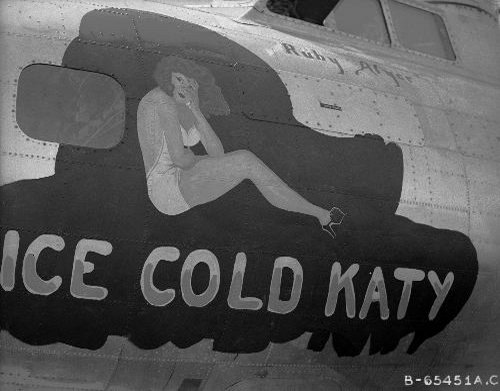
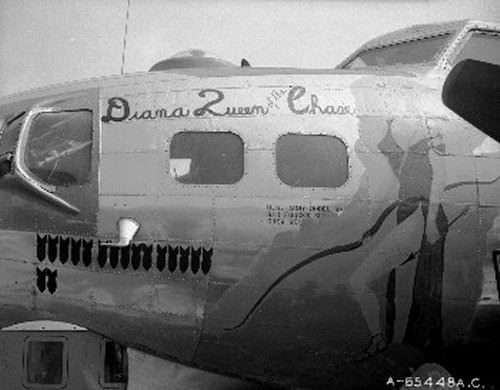
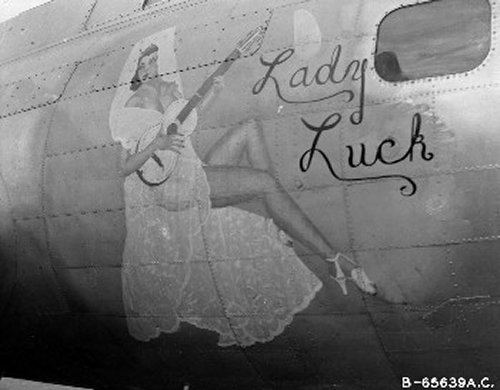
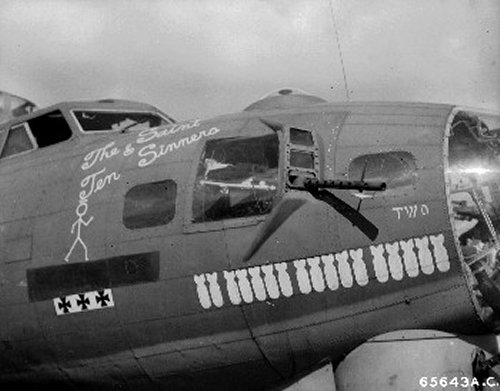
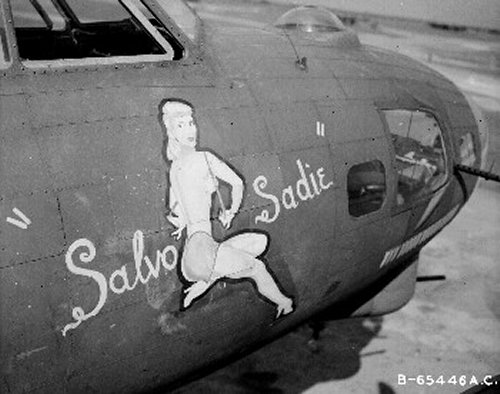
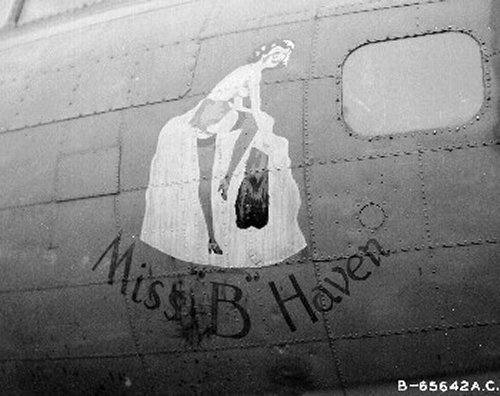
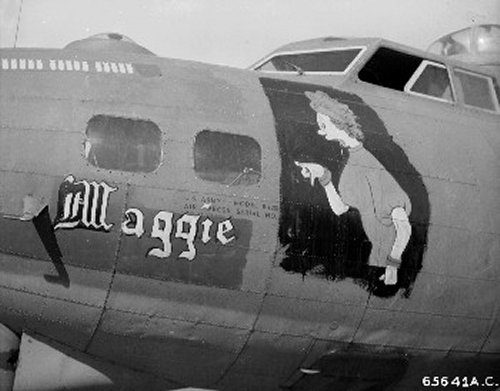
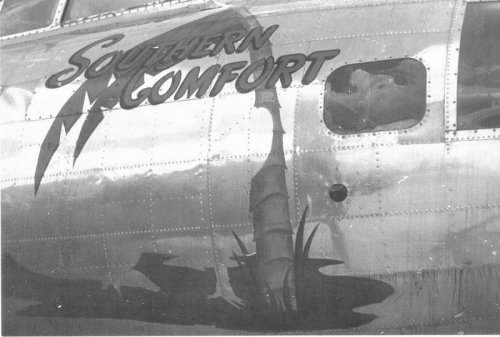
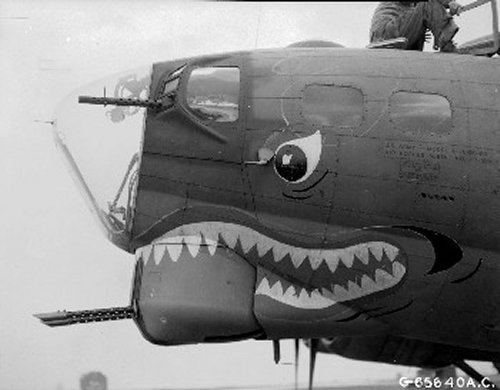
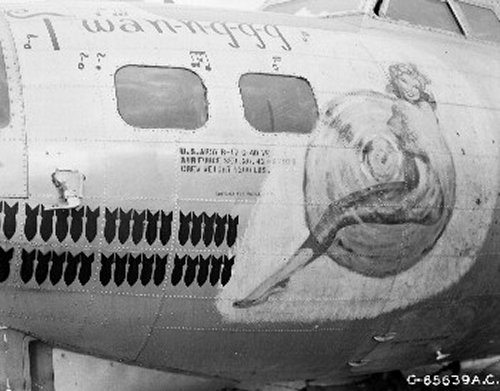
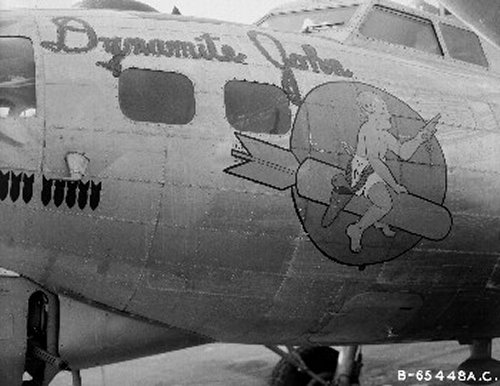
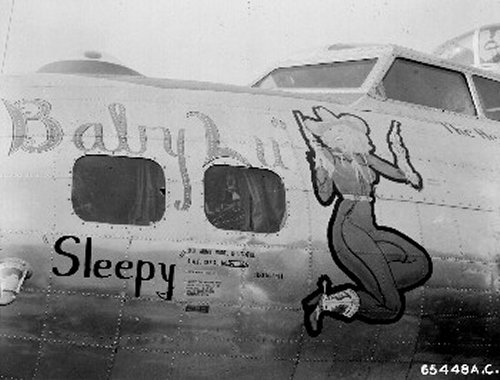
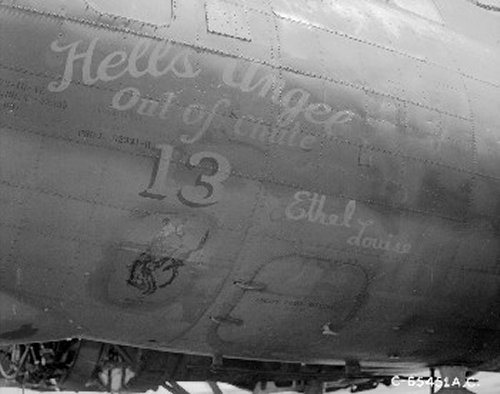
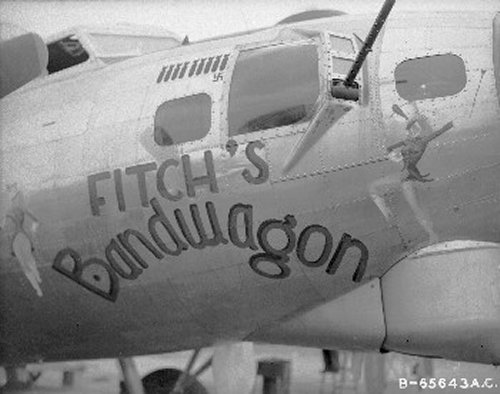
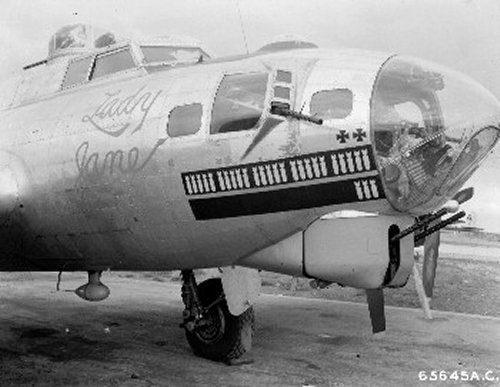
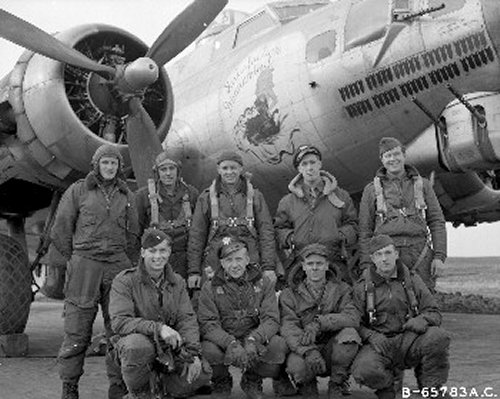
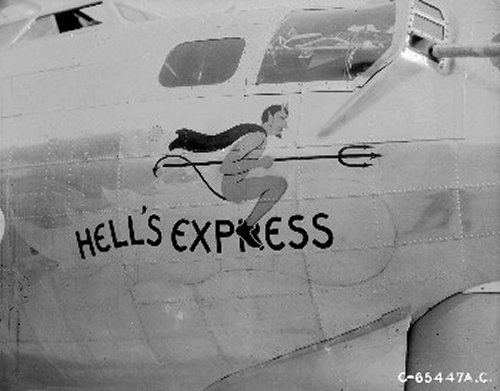
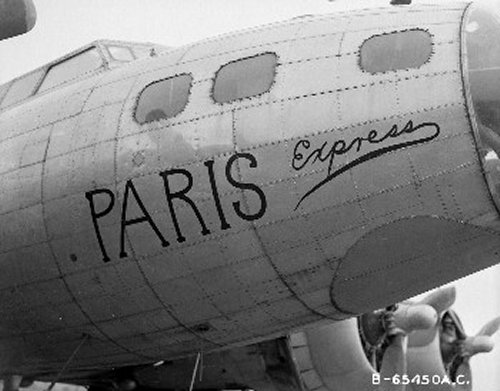
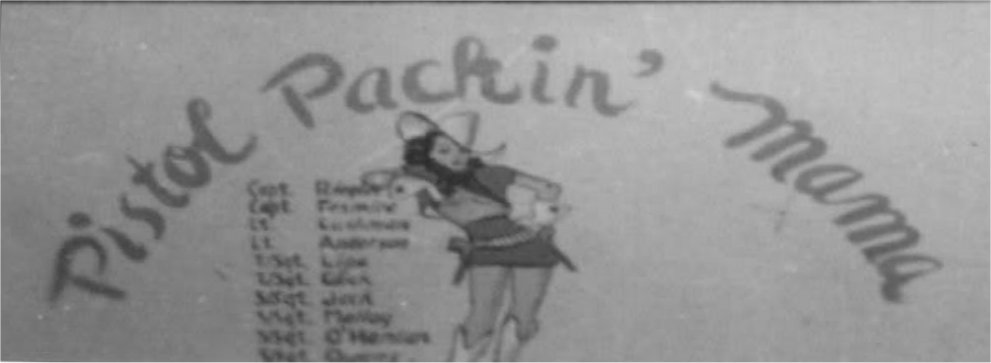
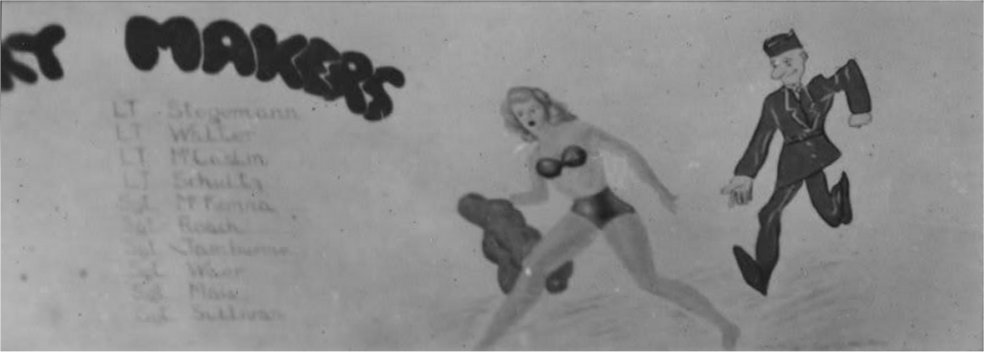
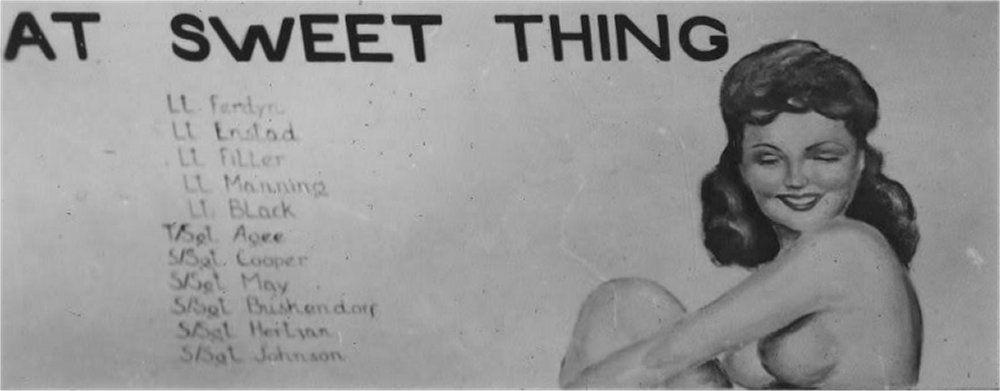
![]()
![]()
![]()